Kathmandu- Nepal’s first hospital to provide care and treatment for Covid-19 patients is the Teku based Shukraraj Tropical and Infectious Disease Hospital. Serving the public since the identification of the first Covid-19 case in Nepal, the hospital, despite limited resources and equipment was able to successfully treat Covid-19 cases.
As the hospital continued to provide care and treatment for Covid-19 patients, a new problem arose – management of healthcare waste of Covid-19.
Mainly, how to scientifically manage healthcare waste such as the equipment used by a healthcare worker while treating an infectious patient, or other materials which came in physical contact of the patient? Confusion around health care waste management surrounded hospital authorities.
The hospital did have past experience in handling health care waste of other infectious diseases, and therefore adopted the same scientific method to disinfect health care waste pertaining to Covid-19. However complexities arose when ensuring safe disposal of the disinfected waste. Local municipalities’ waste collectors refused to go near the waste fearing their own health, and/or other waste management companies too did not show an interest in the same.
In the early days, when confusion and other fears attached to the virus prevailed, the hospital’s waste continued to mount. The Ministry of Health and Population too was not able to issue guidelines about Covid-19 health care waste management then. The hospital then, in consultation with the metropolitan city administration, started to scientifically dispose disinfected health care waste.
According to Dr. Sagar Rajbhandari, Director of Shukraraj Tropical and Infectious Hospital, the hospital currently separates/filters health care related waste after purification (autoclave). Regular non-hazardous waste is then disposed by the metropolitan city, and other materials such as the infectious person’s clothes, PPE, etc is cleaned scientifically within the hospital.
Problems relating to health care waste care management was not limited to only the Teku based hospital, but also within Patan Hospital and the Armed Police Force Covid-19 Hospital initially.
According to Bhogendra Dotel, ex-director of the Management Division of the Department of Health Services, “management of health care waste is challenging not only within Covid-19 hospitals, but also within quarantine and insitutional isolation facilities”. According to him, “waste care management of the 175 Nepalis repatriated from China, and quarantined in Bhaktapur, proved to be the most difficult.”
“Almost 100 drums of waste had been collected from the flight itself. Because we could not manage the waste, it had remained at Tribhuvan Airport for three days”, he added.
In the APF Hospital in Balambu, the hospital had to manage its waste within the hospital after the municipality’s waste collectors refused to collect the waste. The hospital’s focal person, Dr. Pravin Nepal explains that “initially, owing to limited information, a lot of people were afraid of the virus. The waste collectors refused to collect the waste, and we could not force them to do anything. Therefore we arranged our own waste management system.”
In the quarantine facility at Kharipati, Bhaktapur, during the quarantine period of the 175 Nepalis repatriated from Wuhan, the challenges were mounting. Nepali Army’s Dr. Nabin Phuyal, who was directing the quarantine period remembers reaching out to the Ministry of Health and Population for immediate advice on waste management.

Teku Hospital currently ensures proper disinfection before segregating the waste. The segregated waste materials are then bagged. “So as other people do not reuse the PPE, we shred them before baggin them”, Director Rajbhandari shares.
The government of Nepal, after witnessing a surge in cases of Covid-19 in Nepal, listed hospitals which would admit and treat Covid-19 patients. According to the MoHP, there are 74 such listed hospitals at the moment.
It is important for these hospitals to ensure that Covid-19 and non-Covid-19 health care waste materials are segregated on time – if they are not separated early, the entire hospital’s waste could be contagious. Therefore increasing the risk of further transmission.
Generally up to 20% of hospital waste is considered contagious. However, if they are not separated on time, the entire 100% could be contagious.
According to the MoHP, a hospital needs to segregate its waste (contagious, general, degradable, non-degradable) within the ward/division itself. The waste is then treated via environment friendly technologies either by autoclave or microweb before undergoing a purification process. If this is not possible, biodegradable waste must be safely stored for seven days before being safely buried.
Interim Directive arrived only in Ashar (June-July)
The MoHP provided an interim directive pertaining to management of health care waste pertaining to Covid-19 in Ashar (June-July). According to the directive, waste from all patients (Covid-19 positive and suspected) are to be treated as the same, and all waste collected from their care should be kept in properly labelled bins/buckets. Sharp objects must be kept safely inside a box. The directive also explains the entire waste care management process: for example, to minimise waste, classification of waste, collection of waste, transfer of waste, collection, treatment, and proper disposal.
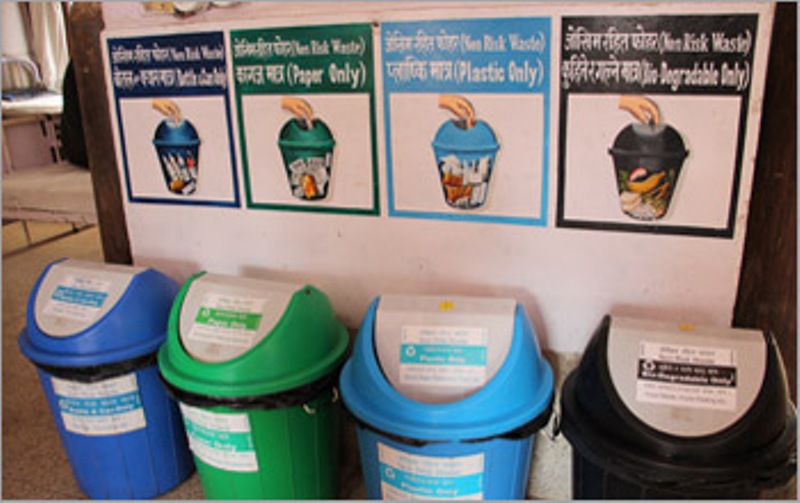
Currently there are only a few hospitals which ensure techonology enabled management of waste such as purification via autoclave. Most of the hospitals are either seen burning the collected waste within the hospital premises, or sending the waste to landfill sites via garbage disposal vehicles. Such practices could be detrimental to public health, and increases risk of exposure within healthcare workers, volunteers, waste collectors, and other frontline workers. Exposure to them would mean exposure to their immediate family members, and the community by extension.
The directive has instructions on waste care management such as trying to reduce health care waste, classification, segragation of waste, storage, their treatment, and how to bury the waste properly (within the hospital premises itself). The directive also has instructionson ways to lessen the impact on the environment, and proper disposal.
According to the ministry, during normal times, the waste from health institutions would be classified as general and hazardous. If the hazardous waste is not treated properly, it could mean further transmission, therefore putting healthcare workers, their families and other people at risk.
According to World Health Organisation, hospitals and health institutions generally produce up to 85% general waste, and 15% hazardous waste. If this 15% isn’t treated with care, it poses further risk to public health.
During Covid-19, every thing that comes in physical contact of an infectious person is considered hazardous – their food, their utensils, etc. Therefore, waste management from health care institutions must be done with extreme care.
In a hospital, degradable waste is collected in green buckets, non-degradable in blue, pathological, sharp medicinal and cytotoxic waste in red, hazardous chemicals in yellow, and hazardous radioactive waste in black buckets.
Currently, all Covid-19 hospitals follow the same procedure. The buckets have plastic bags, and once they are full, cleaners in the hospital wearing Personal Protective Equipments (PPEs) bin the bags and place them in a trolley. The bags are then placed in designated zones.
According to the directive by the Health Ministry, protocols must be followed to ensure proper management of waste. Before collection and storage, the bins must be clearly labelled – sharp medicinal equipments and hazardous waste should not be exposed. Bags must not break, and all waste must be collected safely. The non-hazardous waste too must be bagged properly, and be given to the municipality’s waste collectors for proper disposal.
Other spaces besides designated hospitals such as quarantine centres (home/hotel), holding cells or other restricted areas must also collect all PPE gears (including masks and gloves) safely. The collected waste must be bagged with care and separated from other general waste. The tightly bagged waste must then be wiped with 0.5% Chlorine liquid disinfectant. The bag must be disposed properly (burned/buried), or be given to a local organisation who is involved in disposal of health care waste.
Also, all waste of the infected: such as blood or other bodily fluids, samples, used chemicals, swap, bandage, cotton, or other equipments used in the patient’s treatment, must be properly bagged/sealed, and then placed in the bin marked biohazard and be treated under proper directions. The directive instructs such waste to be managed within 24 hours of collection.
Those providing care to patients at home must collect all masks, gloves and other waste, keep it in the infected’s room, and ensure proper disposal of waste.
Training to healthcare workers
As number of cases of Covid-19 surged in Nepal, and along with it, problems associated with health care waste management increased, GIZ, a German development agency provided health care waste management training to healthcare workers in 13 designated Covid-19 hospitals spanning all seven provinces of Nepal. Along with the training, GIZ also provided equipments for waste management to the hospitals.

GIZ has helped in the waste management of these hospitals: Shukraraj Tropical and Infectious Diseases Hospital, Bir Hospital, Patan Academy of Health Sciences, Armed Police Force Hospital Balambu, Mechi Hospital, Sagarmatha Hospital, Janakpur Hospital, Bharatpur Hospital, Lumbini Hospital, Rapti Academy of Health Sciences, Bheri Hospital, Seti Hospital, Mahakali Hospital.
How was the 100 drums of waste collected at Tribhuvan Airport managed?
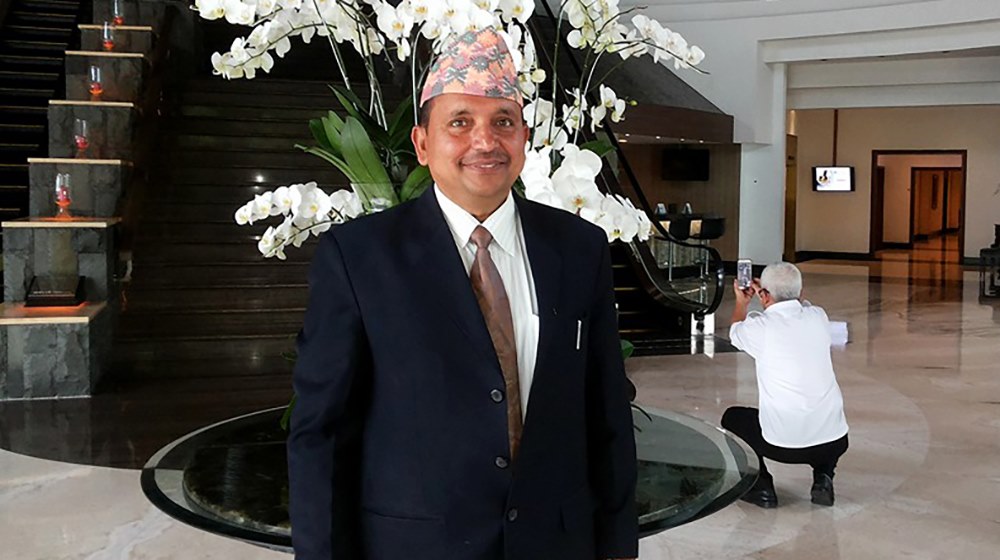
Bhogendra Dotel, ex-Director, Management Division, Department of Health Services
At the time, Covid-19 infection was on the rise, and rapidly spreading to several countries. In Nepal too we were making necessary preparations. Our concern was with the stranded Nepalis in Wuhan, China because the number of cases in Wuhan was very high. There was also an ongoing lockdown in Wuhan. Everyone became very happy after learning about the government’s decision to repatriate the stranded Nepalis.
On 16th February, 2020, a Nepal Airlines flight with 175 Nepalis aboard the plane landed at Trubhuvan International Airport. They were then transferred to the Kharibot based quarantine centre at Bhaktapur. However, another problem ensued.
The 175 passengers had adorned PPEs – collecting them and other safety equipments, we were faced with one hundred drums of waste. We were able to collect them safely, but did not have sound knowledge on its disposal. We talked to the airport authorities – but at the time there was much fear about the virus. We then approached the municipality – but at a time when the local community feared arriving passengers, waste from the passengers created more fears. We could not leave it in the open inside the airport premises too. We then spoke to Teku Hospital too, but could not arrive upon a solution.
We then spoke with hospitals which had facilities to manage health care waste and learned that three hospitals were equipped with plants to treat health care waste – namely TU Teaching Hospital, Kathmandu Medical College, and Kidney Centre. We spoke to the directors of the three hospitals.
The hospitals communicated to us that they would be unable to handle hundred drums of waste all at once, therefore the load had to be divided into seven days. We also had to factor in the fact that the public may take notice of the waste being transported during the day, and accordingly scheduled deliveries between 6 p.m. to 5 a.m. Organising their disposal took us three days to coordinate – during the time the waste was stored at the airport itself. At the hospitals, the waste were treated and managed scientifically.
We manage the waste in an eco-friendly manner:
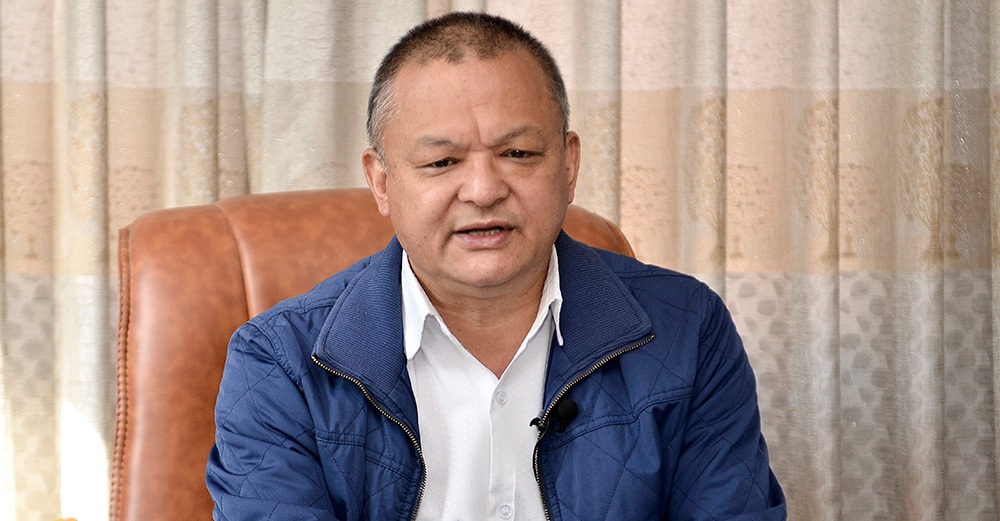
Dr. Sagar Rajbhandari, Director,
Shukraraj Tropical and Infectious Disease Hospital
Waste management work at our hospital is different to other hospitals. Initially we were met with a lot of dificulties while managing health care waste. However, now we are able to manage our waste within the hospital itself.
Initially, for a few days, the municipality’s waste collectors too did not show up, neither did other waste management companies show any interest. But following a few consultations within the hospital, we were able to solve the problem. Today, we manage health care waste in an environment-friendly manner via autoclave. Other waste too, we categorise accordingly and treat them.
Firstly, we ensure that all waste is disinfected to become non-infectious. We clean patients’ dress, bedsheets, and blankets within the hospital itself. We disinfect them, rinse them in hot water at 90 degree celsius before putting them inside the washing machine. We then let them dry in the sun.
We have also placed a suction machine at the ward where we keep our Covid-19 patients. That machine was installed during the lockdown, when we started getting high cases of Covid-19 at our hospital. The machine disinfects the wards air before releasing it out in the open. Accordingly, we have reduced the risk of transmission.
After coming in as the new director at the hospital, I have stopped the practice of burning health care waste. Burning health care waste contributes to pollution, and is more hazardous. The smoke adds to air pollution and affects public health. Today, waste which can be recycled, or is bio-degradable is sent away for proper treatment and disposal.
We also sell recyclable waste from which we are able to earn an estimated NRS 200,000 every year.
Health care waste is managed within the hospital

Pravin Nepal
Armed Police Force Covid-19 Hospital, Balambu
We have been managing our health care waste within the hospital since we started admitting Covid-19 patients.
After the municipality’s workers refused to collect our Covid-19 related health care waste, we realised we could not force them to do so, therefore took matters in our own hands. We utilised the open space behind our hospital for health care waste management. After autoclaving the waste, we bury the bio-degradable waste. Those waste that can be recycled, we purify them, and re-use them. Waste which is not bio-degradable or recycled, we burn them. For that purpose, we have dug three large pits, and burn the waste in them turn by turn.
For managing waste via burning, we have created a special apparatus – we have created a metal base on top of the bed of the pit, and the smoke is funnelled through pipes to manage the smoke.
For non-Covid19 waste, we have an arrangement with the municipality for its waste disposal.
We don’t have a culture of working collectively
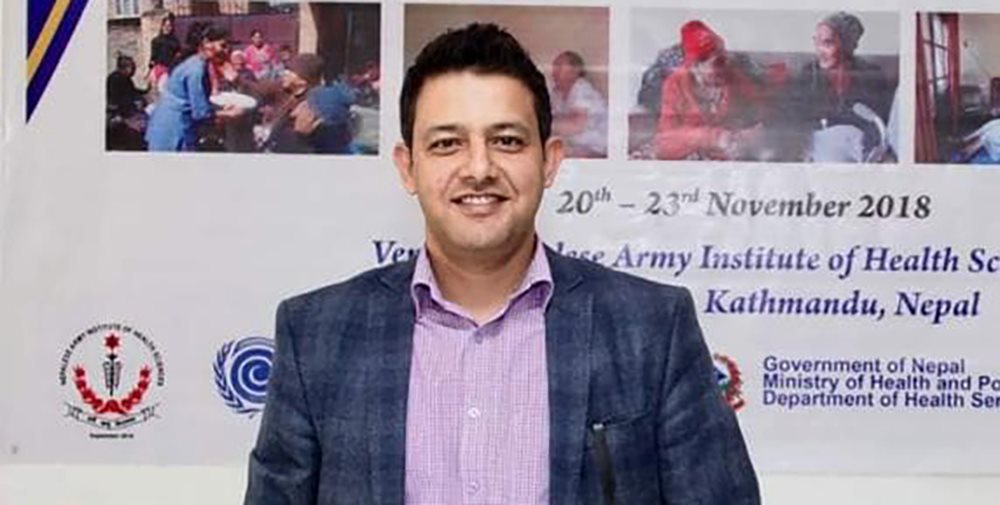
Dr. Nabin Phuyal, Army Hospital
We had safely placed the 175 returnees at Kharipati quarantine centre. At the time, fears surrounding Covid-19 was very high. We had even arranged a separate septic tank for managing human waste.
Although we realise today that the arrangement of a separate septic tank was unnecessary, at the time, because the disease was new, we took no chances with making safety arrangements. At the quarantine centre, there was no medical waste, only human and food waste.
The amount of waste coming from the quarantine centre was in large amounts – it became a huge challenge to manage the waste. The autoclave machines in Nepal were only able to handle 60 – 70 litres. We did not receive any support from the metropolitan city office too. We therefore reached out to the Ministry of Health and Population for advice on waste management. The Ministry gave us advice – we then dug a huge pit and dumped the waste there. Before dumping them, we ensured the waste was disinfected via autoclave. Besides that, we only had to burn paper-related waste one or two times.
In reality, we had to deal mostly with food related wastage. They had to undergo two tests, but the waste from those tests were managed by the National Public Health Laboratory itself.
If you observe the practice of other nations, waste management related affairs are handled by the ministry responsible for environment management. The ministry for environment will issue guidelines of health care waste management, and the local governments follow suit. But here, the entire responsibility was shouldered upon the hospital. Whereas in fact, we don’t even have a personnel in the field of waste management.
When establishing a new hospital, the environment ministry will advise the hospital in health care waste management, and set guidelines and fines for breaching such advices. But in Nepal, hospitals take care of their own waste. The government does not follow-up on waste management with the hospitals.
In the context of Covid-19 too, there are a lot of isolation centres. These centres will come into use during other epidemics too. Therefore, proper attention to their waste management must be paid. Also, most importantly, we need to work collectively – but in Nepal we don’t embody that spirit of collective action.
We ensure purification via autoclave machines before disposing waste
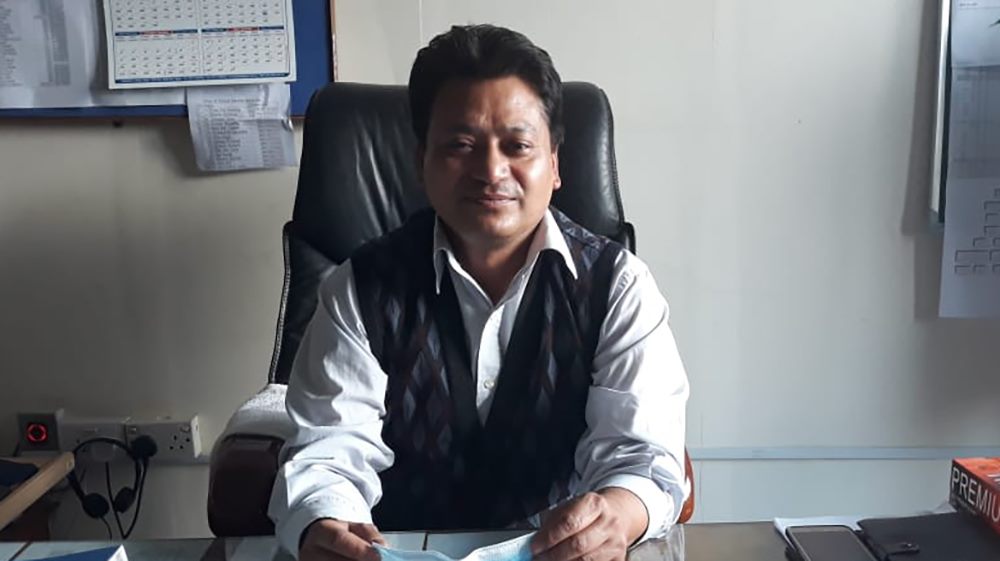
Dr. Rabi Shakya, Director, Patan Hospital
We have been paying attention to waste management since the establishment of Patan Hospital as a treatment centre for Covid-19. We already have a system here which has been modified to suit current needs better. Waste is segregated inside the Covid-19 ward itself, and then all waste is disinfected via chlorination. The disinfected waste then undergoes a purification process.
We ensure purification via our autoclave machines before disposing waste. But this too has its own challenges – because suddenly the load has increased but not the capacity of the machines. We have three autoclave machines – of which two were already spoilt. After the load increased, we got one repaired with great difficulty, but two autoclave machines is not enough.
These machines are operated continuously for 24 hours. We are planning to add another machine, and have not compromised on any aspect of safe health care waste management.
No problems in managing health care waste so far
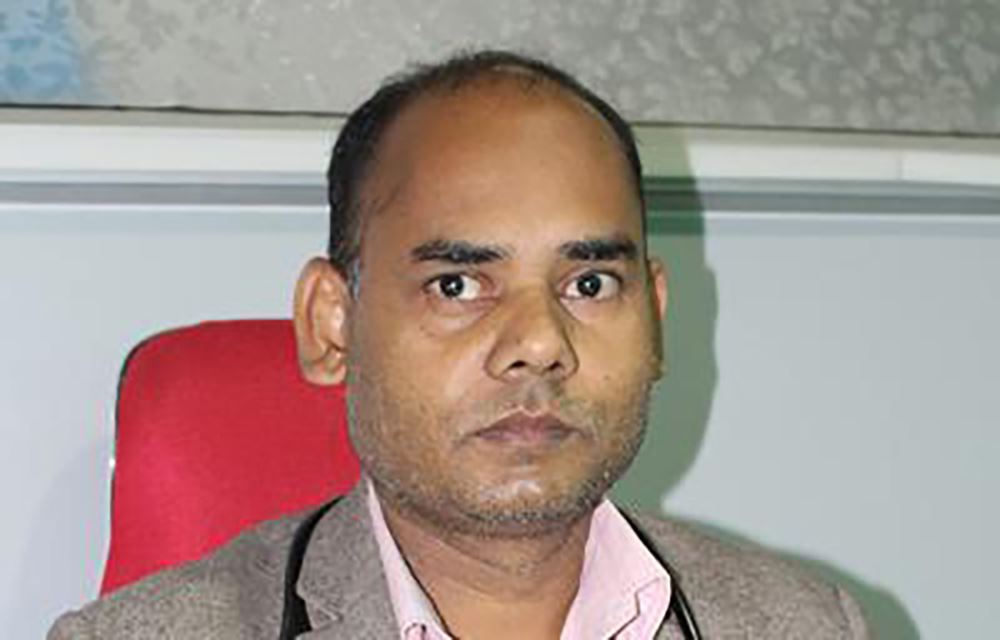
Dr. Santa Kumar Das, TU Teaching Hospital
We have two systems for health care waste management. One is a dedicated organisation for waste care management which functions as a management system. We segregate infectious and non-infectious waste and recycle those waste that can be recycled after it undergoes a purification process.
We usually classify waste as infected and non-infected, however owing to Covid-19, we classify all waste as infected. All Covid-19 related health care is disposed together.
Till date, we haven’t received any complaits about waste management from the housekeeping department. We have been able to manage it well.
Translated by : Pankaj Thapa

